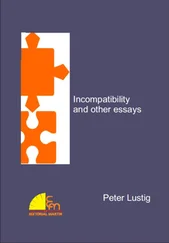LX
While the lights in the auditorium are slowly dimmed in a theatrical manner, the open stage is only moderately lighted. The objects are in exactly the same position as before the intermission. The closet is open. Two Kaspars are sitting on the sofa, close together. They are silent. The masks now evince an expression of contentment. After a few moments of silence, the prompters begin to recite all over the room:
LXI
While giving a beating
one is
never as calm as while beating a rug.
Water dripping regularly
down on one’s head
is no reason
to complain about a lack of order
a sip of acid in one’s mouth
or a kick in the guts
or two sticks
in the nostrils being wriggled
about
or something on that order
only more pointed
introduced
into the ears
without much ado
to needle someone
and bring him around
with all means
at one’s command
primarily
without being fussy about the
means
is no reason
to loose any words over the lack of order:
for
in the process
of putting-into-order
for better or worse
one makes others sing
whereas one—
once everything has been brought
to order
and everything that still laughed
is laughable—
can sing oneself
and after giving a beating
when fists and feet have nothing
left to
do
can beat the rug to ease one’s
mind. A third Kaspar with a small package wrapped in wrapping paper comes out of the wings and sits down next to the other two Kaspars, sits down in an orderly fashion, the package on his knees. In the process of putting-into-order
one is not as calm
and orderly
as later on
when one—
having been brought into order
oneself
by the thrashing one has given to
others—
with one’s conscience at ease
wants to
and can
enjoy
a world made orderly. A fourth Kaspar comes on stage with a similar package. Kaspar 3 makes room for him between himself and the other two Kaspars. Kaspar 4 sits down quietly. All four Kaspars are still. While giving a beating
it is sensible
not to think of the future
but in the pauses
between punches
it is blissful
to think of the time of order
so that
a too disorderly kick
won’t contribute
during the recommencement of the
beating
to channel the thoughts
of the socially sick
when he has adjusted
later on
in the wrong direction. A fifth Kaspar enters with a similar but perhaps larger package. Kaspar 3 gets up. Kaspar 5 takes Kaspar 3’s place. Kaspar 3 squeezes himself into the small space left next to Kaspar 4. Kaspar 5 puts the package in front of him on the floor. All five are still. But if
during the beating
an inordinate beating of the heart
fails to occur
and the fists
beat
the breath out of the victim’s
lungs
only (to use the same image again)
like dust
out of a rug
and one only
straightens out (to use the same image again)
the wretch’s tongue
like fringes on a rug
only then does
the injustice occur:
for
while giving a beating
one should not be as calm
as when beating a rug
while plugging up the mouth
one must be uneasy:
so as not to become uneasy
afterwards:
the failure of an inordinate
beating
of the beater’s heart while
he is giving a beating
is bad:
for
anyone whose hand has trembled
suitably
while giving a beating
has a clean slate
and is one more person
who will have to have no qualms
later on:
thus calm reigns on earth. The original Kaspar comes on stage as he did at first, but without having to look for the slit in the curtain. His movements are self-assured and he looks like the other Kaspars. His mask too should show a contented expression. He walks with firm steps to the front of the stage, as though to take a bow, nicely avoiding all objects. He stops in front of the microphone. All six Kaspars are still. Those who have been brought to order—
instead of withdrawing into themselves
and fleeing society—
should now realistically seek
without force or beatings
but out of their own strength
to show new ways
by looking for sentences
valid for all:
they cannot choose
they must choose
and tell the others
the truth about themselves
without phrases
or bubbles:
the others too
should finally be able to want to do
what they themselves
now want and should do.
LXII
Kaspar, at the microphone, begins to speak. His voice begins to resemble the voices of the prompters.
Already long
in the world
I realized nothing
I wondered
about the self-evident
and found everything finite
and infinite
laughable every object filled me with fear
the whole world galled me
neither did I want to be myself
nor somebody else
my own hand
was unknown to me
my own legs
walked of their own accord
I slept
deeply
with open
eyes:
I was without consciousness
like someone drunk
and though I was supposed to be
I wanted not to be
of use
to anything
each sight
produced dislike
each sound
deceiv-
ed me
about itself
each new step
produced
nausea and sucking
in my chest
I could not keep up
I blocked my view
myself
no light
lit up for me
with the whole mishmash
of sentences
it never occurred to me
that it was I who was meant
I noticed nothing of what
was happening around me
before I began
to come onto the world. He is quiet for a moment or more. The other Kaspars behind him are also rather still. I felt
the cacophony
the screaming
outside
was a roaring
and gurgling
in my guts:
I had to suffer,
could not distinguish
among anything:
three was not more
than two
and when I sunned myself
it rained
while I
when I was sweating
in the sun
or heating myself
running
fought my sweat with an umbrella
I could keep nothing apart
neither hot from cold
nor black from white
neither yesterday from today
nor the new from the old
neither people from things
neither prayer from cursing
neither caressing from kicking
every room
looked flat
to me
and hardly
was I awake
when the flat objects fell all over me
like a dream image:
they became obstacles
all the unknown objects
interrogated me
at once
all indistinguishables confused
my hands
and made me wild
so that I became
lost
among the objects
lost my way and
to find my way out
destroyed them. He is quiet for a few moments. The Kaspars behind him are quiet too. I came into the world
not by the clock
but because
the pain
while falling
helped me drive
a wedge
between me
and the objects
and finally extirpate
my babbling:
thus the hurt finally drove
the confusion out of me. I learned to fill
all empty spaces with words
and learned who was who
and to pacify everything that
screamed
with sentences
no empty pot confuses my brain box
any more
everything is at my will
never
Читать дальше












